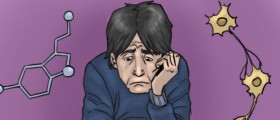
Nervous breakdown may happen to a person of any age. Nervous breakdown occurs due to a great deal of stress and suppressed emotions. People who are constantly under stress may get a nervous breakdown as a response to that stress.
Symptoms of Nervous BreakdownNervous breakdown is associated with number of reasons and depression is one of the most common ones. Depression is not a specific symptom and it may result out of many other medical conditions. However, this symptom is a serious one and can not be overlooked. Usually, an individual who has experienced a nervous breakdown is not aware of the depression and this is often also the case with the sufferer’s family. The condition is usually interpreted as a sign of exhaustion leaving the depression neglected. Left untreated, overall situation may get much worse with time.
On the other hand, there is one specific symptoms of nervous breakdown and that is alienation. Alienation occurs when the affected person avoids contact with others and isolates from close friends and family. For such individual, social interaction becomes virtually unbearable and spending time alone at home becomes preferable over any kind of socializing.
It is good to know the symptoms of nervous breakdown in order to recognize them so that appropriate measures can be taken. A common physical sign that indicates a nervous breakdown is sweating. Also, the face becomes pale. These symptoms occur as a reaction of the vegetative systems.
Yelling and aggression are also common. Yelling is caused by an explosion of emotions that were suppressed for a long time. This yelling may turn into aggression toward friends, spouse, kids, boss or others. These symptoms should be managed with sedatives as people with nervous breakdown are out of control and may eventually harm those around them.
Disorientation is another specific symptom of nervous breakdown. The person with nervous breakdown may become confused about their location or may have difficulty recognizing themselves in the mirror.
Other symptoms associated with nervous breakdown include short term memory lapse, hallucinations, delusions, restlessness, paranoid thoughts, suicidal thoughts, inability to stop crying, changes in appetite, sleep disruption, breathing problems and migraine. In extreme cases, the affected person may completely lose contact with reality. This requires professional help as the state which the affected person is in may prove to be dangerous to him and others.
The symptoms of nervous breakdown may vary. Some may start using drugs to relieve the tension, some may turn to alcoholism or gambling or exhibit vandalism. Sometimes, hospitalization may be needed to control the condition. Nervous breakdown is commonly treated with medications and different forms of psychotherapy.

















Your thoughts on this
Loading...